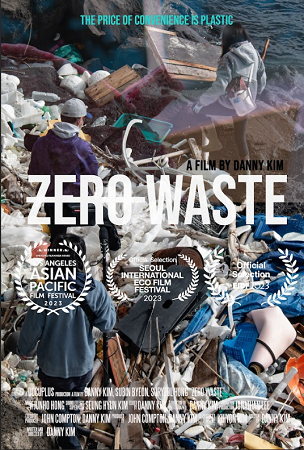
Zero Waste 2023
Distributed by Good Docs
Produced by John K. Compton and Danny Kim
Directed by Danny Kim
Streaming, 71 mins
College - General Adult
Environmentalism; Recycling
Date Entered: 03/19/2024
Reviewed by Kathleen H. Flynn, Science Librarian, University at AlbanyThe topic of plastic pollution is increasingly being discussed as people worry about issues ranging from the effect of plastic in the oceans on marine animals to microplastics in the human body. The film Zero Waste focuses on recycling and upcycling efforts in South Korea, a country that currently recycles 30% of its plastic. Although this recycling rate is above average compared to the rest of the world, South Korea ranks number three in the world for single use plastic waste generated per person. In 2019 alone, disposable plastic usage was up 20%. A common challenge that nations face when tackling this problem is how time consuming and difficult it can be to recycle plastic. As a result, much of the plastic waste comes from cosmetic bottles that are simply thrown out.
The film showcases several initiatives to reduce plastic waste in South Korea by citizens, companies, and governments. One government led example is Jeju Island, whose government pays locals to clean the shores of plastic waste that mostly drifts in from abroad. The city of Seoul also aims to increase the already impressive recycling rate to 70%. Citizen led projects range from locals who volunteer to clean the shores to upcycling businesses to artists using plastic waste to produce art and practical items.
Although there is a sense of urgency in the film, there is also a hopeful tone. The film is effective at conveying the dedication of South Korea’s citizens to collaborating with each other, companies, and governments to make positive changes. The film is in Korean, but subtitles and descriptive onscreen text are in English. There was one instance where the text from the screen disappeared before it could be reasonably read, but the text is otherwise legible. As it gives a good look into what a large plastic waste producing country is doing to combat plastic pollution, it is recommended for library collections.
Awards: Emerging Filmmaker Award, Los Angeles Asian Pacific Film Festival; Green Award, Terraviva Film Festival; Official Selection, EBS International Documentary Film Festival; Official Selection, Seoul International Eco Film Festival
Published and licensed under the Creative Commons Attribution 4.0 license. Anyone can use these reviews, so long as they comply with the terms of the license.